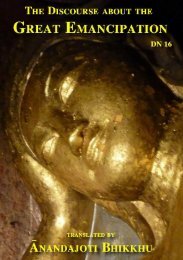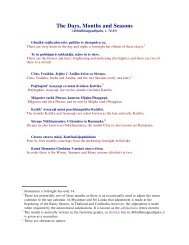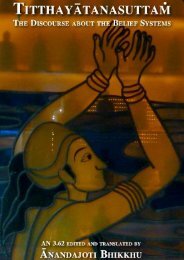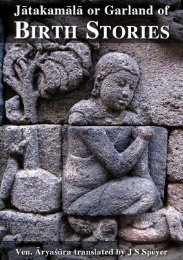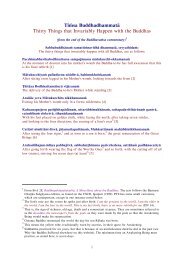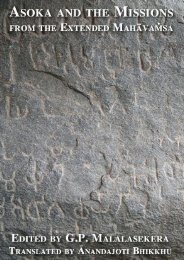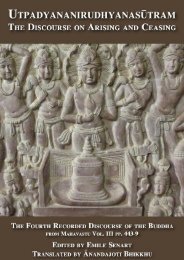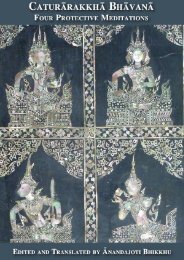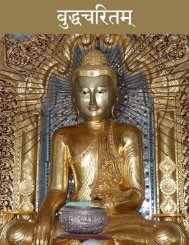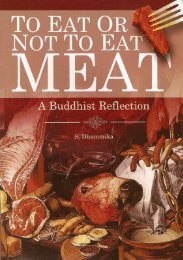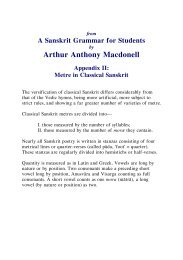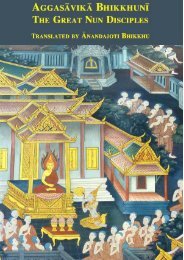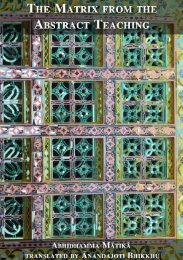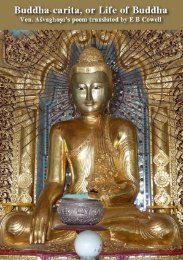MahÄkhandhako The Great Chapter - Ancient Buddhist Texts
MahÄkhandhako The Great Chapter - Ancient Buddhist Texts
MahÄkhandhako The Great Chapter - Ancient Buddhist Texts
Create successful ePaper yourself
Turn your PDF publications into a flip-book with our unique Google optimized e-Paper software.
IV. In Rājagaha - 161<br />
evam-eva ekādasanahutānaṁ Māgadhikānaṁ brāhmaṇagahapatikānaṁ,<br />
just so to eleven myriads of the Magadhan brāhmaṇas and householders, 201<br />
Bimbisārappamukkhānaṁ tasmiṁ yeva āsane,<br />
with Bimbisāra at their head on that very seat,<br />
virajaṁ vītamalaṁ Dhammacakkhuṁ udapādi:<br />
the dust-free, stainless Vision-of-the-Dhamma arose: 202<br />
“Yaṁ kiñci samudayadhammaṁ,<br />
“Whatever has the nature of arising,<br />
sabban-taṁ nirodhadhamman.”-ti<br />
all that has the nature of ceasing.”<br />
ekanahutaṁ upāsakattaṁ paṭivedesi.<br />
and one myriad (of them) made known their state as lay-followers.<br />
Atha kho Rājā Māgadho Seniyo Bimbisāro, diṭṭhadhammo pattadhammo,<br />
<strong>The</strong>n the Māgadhan King Seniya Bimbisāra, having seen the Dhamma, attained the<br />
Dhamma,<br />
viditadhammo pariyogāḷhadhammo tiṇṇavicikiccho vigatakathaṁkatho,<br />
understood the Dhamma, penetrated the Dhamma, crossed over uncertainty, being<br />
without doubts,<br />
vesārajjappatto aparappaccayo Satthusāsane Bhagavantaṁ etad-avoca:<br />
having attained full confidence, having become independent of others in the<br />
Teacher’s teaching, said this to the Gracious One:<br />
“Pubbe me Bhante kumārassa sato pañca assāsakā ahesuṁ<br />
“Formerly, venerable Sir, when I was a boy I had five wishes 203<br />
te me etarahi samiddhā.<br />
which are fulfilled for me now. 204<br />
201 This number is confirmed by Mahāvastu (3.449), but the latter text omits the mention that<br />
one myriad more became lay-followers, mentioning instead that twelve myriads of the<br />
coachmen and drivers became lay-followers. See the end of <strong>The</strong> Fourth Discourse of the<br />
Buddha.<br />
202 Comm: Dhammacakkhun-ti sotāpattimaggañāṇaṁ; knowledge of the Path of Stream-Entry.<br />
203 Comm: Assāsakā ti āsīsanā; patthanā ti attho; assāsaka means desires, wishes is the<br />
meaning.<br />
204 Lit: are successful, have taken effect.



